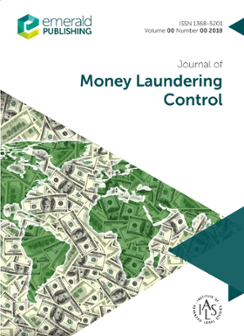Table of contents
Measures to combat money laundering and terrorist financing in Palestine
Murrar FirasThe purpose of this paper is to analyse the evolution of anti-money laundering/combating the financing of terrorism (AML/CFT) procedures in Palestine since 2004 in accordance with…
Rebuilding public trust through the lens of corporate culture: an inevitable necessity to sustain business success in Australia
Afroza BegumThis paper aims to promote corporate culture (CC) of compliance to ensure responsible business by motivating self-felt and self-imposed strategies by corporations in Australia. It…
Mechanisms of money laundering obtained from cybercrime: the legal aspect
Yuriy Yu. Nizovtsev, Oleg A. Parfylo, Olha O. Barabash, Sergij G. Kyrenko, Nataliia V. SmetaninaThe use of computer technology to commit cyber laundering increases their social danger, creates new ways to commit cyber laundering, causes the masking of traces of cyber…
Challenges of money laundering for sovereign states that uses the US dollar
Prosper Simbarashe MaguchuThere has been almost no scholarly work on the challenges of money laundering in sovereign states that use the US dollar as their currency of choice. This study aims to break the…
Reducing corruption and bribery in Africa as a target of the sustainable development goals: applying indicators for assessing performance
Kempe Ronald Hope, Sr.The purpose of this paper is to assess African performance for substantially reducing all forms of corruption and bribery on the continent by 2030, through the indicators for…
“Cyber-laundering”: the change of money laundering in the digital age
Christoph WronkaThis study aims to illustrate and determine how illegally obtained funds are laundered through online platforms and companies in different economic sectors in the digital age.
Appraisal of the regulatory frameworks for combatting money laundering in Nigeria
Adegboyega Adekunle IgeA review of literature revealed that many publications on efforts at combatting money laundering focus on two frameworks, namely, legal/legislative and institutional, while…
Non-linear impact of globalization on financial crimes: a case of developing economies
Rabia Muhammad Amjad, Abdul Rafay, Noman Arshed, Mubbasher Munir, Maryam Muhammad AmjadThe Financial Action Task Force defines money laundering as “processing of these criminal proceeds to disguise their illegal origin”. This is the major portion of financial crime…
Trade-based money laundering (TBML) empowers criminals to run free post-Brexit
Mariola Jolanta MarzoukThis paper aims to provide unique empirical findings exploring the impact of the UK’s post-Brexit Economic Strategy to boost trade with developing countries on the UK banking…
National risk assessment – the Croatian features
Sonja CindoriThe purpose of this paper is to present the risk of the non-financial sector in Croatia concerning the threats of money laundering through the prism of national and supranational…
Anti-money laundering in the United Kingdom: new directions for a more effective regime
Rafael Pontes, Nick Lewis, Paul McFarlane, Patrick CraigThis paper aims to provide a more nuanced understanding of the effectiveness of the anti-money laundering (AML) regime in the UK and explore opportunities to improve policy and…
Effect of cultural tightness-looseness on money laundering: a cross-country study
Mariem Mejri, Hakim Ben Othman, Basiem Al-Shattarat, Kais BaatourThe purpose of this interdisciplinary cross-country study is to investigate the influence of cultural tightness-looseness on money laundering.
Examining the predictors of fraud in state-owned enterprises: an application of the fraud triangle theory
Godfred Matthew Yaw Owusu, Theodora Aba Abekah Koomson, Stanley Agbenya Alipoe, Yusuf Ahmed KaniThis paper aims to investigate the views of employees on the motives behind frequently reported fraudulent activities at the workplace. Using the fraud triangle theory (FTT) as…
Factors influencing anti-money laundering regulatory approaches towards casinos and cryptocurrencies in Bangladesh
Md. Zahurul Haq, Zainal Amin Ayub, Zuryati Mohamed Yusoff, Md Abdul Awal KhanThis paper aims to critically explore the factors influencing the regulation of gambling and cryptocurrencies as part of anti-money laundering (AML) initiatives in Bangladesh. As…
Corruption, asset origin and the criminal case of money laundering in Indonesian law
Mahrus Ali, Syarif Nurhidayat, Muhammad Shidqon Prabowo, Rusli MuhammadThis study aims to investigate Indonesian regulation of Article 69 of the Money Laundering Criminal Act (TPPU) related to proving predicate crimes, as it leaves a debate whether…
Modulating corruption and money laundering through the Bretton Woods Institutions: the case of less developed countries (LDCs)
Ejike EkwuemeThe purpose of this paper is to readily bring to the fore, the vital dimension that the Bretton Woods Institutions, exemplified by both the International Monetary Fund (IMF) and…
Money laundering or foreign contribution! The spirit of governance in NGOs of India
Sandeep GoelThe present paper aims to discuss the “money laundering” aspect and related governance practices of third sector, non-government organizations (NGOs). In NGOs globally, foreign…

ISSN:
1368-5201Online date, start – end:
1997Copyright Holder:
Emerald Publishing LimitedOpen Access:
hybridEditors:
- Dr Li Hong Xing
- Prof Barry Rider